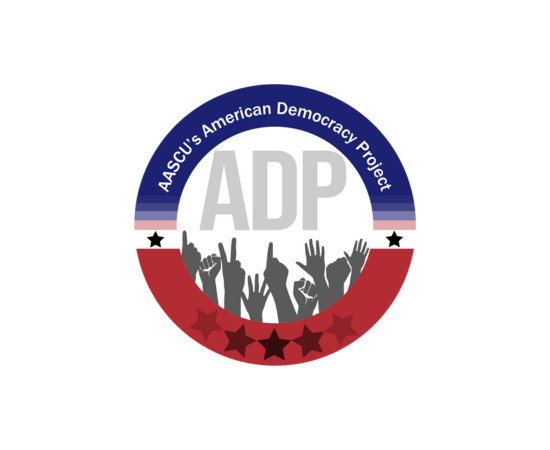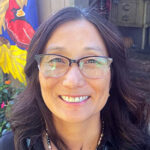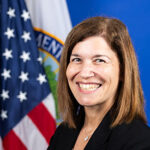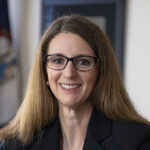Practicing Democracy: Voter Education and Engagement on Campus
Join AASCU’s American Democracy Project in helping our campuses prepare students and communities to participate in the 2024 local, state, and national elections.

Strengthening civic connections.
Build campus-community ties and integrate voter education in your classroom.
The momentous 2024 election season will bring many challenges to AASCU campuses, and this nonpartisan project aims to encourage conversation, demonstrate best practices, and provide critical resources so that our campuses can build capacity and a campus culture that encourages engagement in building a strong democracy.
Register for any sessions that would enhance and assist your work.
- Voter Education Workshops
April 5: Exploring the Impact of Political Ideology on Hot Topics
April 12: Including Deliberative Dialogues in the Classroom
April 19: Artificial Intelligence and the Election
April 26: Ideas for Incorporating Voter Issues Into the Classroom - Voter Engagement Workshops
April 8: Organizing Community Dialogues
April 15: Developing Engaged Students
April 22: Strengthening Campus-Community Voting Initiatives
April 29: Maintaining a Positive Campus Climate During the 2024 Election
Who should attend?
- Faculty
- Staff
- Administrators
- Librarians
How will you benefit?
- Develop support systems and gain access to resources for voter education and voter engagement
- Integrate and apply voter education into learning settings across multiple disciplines
- Review, validate, build, implement, and assess voter engagement plans for campuses
- Connect to colleagues to build a campus culture that fosters voter engagement
Voter Education Workshops
Voter education is defined as building knowledge, civic skills, and democratic values. Sessions include best practices to build knowledge, skills, and democratic values, informational overviews, resource spotlights, and trainings designed to incorporate civics into curriculum and co-curriculum. They are designed for faculty and staff who wish to incorporate information literacy, deliberative dialogues, and issue-based discussions into their campus during fall 2024.
April 5, 2024 | 3-4 p.m.
Exploring the Impact of Political Ideology on Hot Topics
We are complex individuals with the capacity to embrace multiple, sometimes conflicting political perspectives. This session provides an opportunity for participants to participate in and learn about the online “hot topics” political ideology diagnostic and how it can be integrated in and out of the classroom. The diagnostic fosters enhanced critical thinking and diagnostic de-briefing provides opportunities to promote political inclusiveness and explore dissonance.

Patrick
Dolenc
Professor of Economics
Keene State College (NH)

Teresa
Martinez
Interim Co-director for the Center for Community Engaged Learning
Weber State University (UT)

Kim
Schmidl-Gagne
Assessment & Accreditation Officer
Keene State College (NH)

Leah
Murray
Director, Olene S. Walker Institute of Politics & Public Service
Weber State University (UT)
April 12, 2024 | 12-1 p.m.
Including Deliberative Dialogues in the Classroom
Hear of multiple ways to integrate deliberative dialogues into the curriculum. This interdisciplinary tool can redefine your core curriculum practices and provides a strong model for how to have difficult conversations in the classroom.

Kara
Dillard
Associate Director, Madison Center for Civic Engagement and Assistant Professor, School of Communication Studies
James Madison University (VA)

Kara
Lindaman
Dean, College of Liberal Arts
Winona State University (MN)

Verdis LeVar
Robinson
Interim Executive Director
National Issues Forums Institute
April 19, 2024 | 12-1 p.m.
Artificial Intelligence and the Election
AI will play a significant role in elections that are taking place in several countries this year, including the United States. We will discuss the concerns, risks, and opportunities posed by emerging AI technologies during this election cycle.
April 26, 2024 | 12-1 p.m.
Ideas for Incorporating Voter Issues Into the Classroom
From climate change to gun rights to abortion, our democracy requires difficult conversations. With colleagues from across the U.S., explore how to smoothly and safely integrate these contentious topics into your courses.
- Bennion, Elizabeth A. 2024. Civil Discourse: Helping Students Become Better Conversation Partners. The Political Science Educator 27 (2): 6-20
- Bennion, Elizabeth A. 2023. Overcoming Party Polarization in the Classroom. The Political Science Educator 27 (1): 6-18
- Bennion, Elizabeth A. 2023. The Future of Academic Freedom. State Legislatures and Content Bans. The Political Science Educator 26 (2): 5-9
Other resources, articles, organizations, curriculum, recommendations from Elizabeth Bennion:
- National Issues Forums Institute
- Your Bias is
- Your Logical Fallacy is
- Polarization Lab
- Constructive Dialogue Institute
- Unify America
- Resetting the Table
- Braver Angels
- The Better Arguments Project
- The Dialogue Project: How Business Can Reduce Polarization and Build Common Purpose
- Civic Health Project
- Crucial Conversations Courses
- Here’s a great way to get faculty involved in GOTV work. Ask Every Student Faculty Champion
- How Colleges Can Teach Students to be Good Citizens
- Ted Talk: How our friendship survives our opposing politics
The New York Times links:
Voter Engagement Workshops
Voter Engagement encourages and supports peaceful and meaningful participation in elections within our communities. Sessions include strategies for building, implementing, and assessing campus voting plans and understanding legislation about voting on campuses. They are designed for campus leaders who support student and community voting.
April 8, 2024 | 11:30 a.m. – 12:30 p.m.
Organizing Community Dialogues
How can you build an culture on campus that values each student’s opinions? Learn more about how to organize community deliberative dialogues that move conversation and build healthy relationships.

Alex
Dennis
Senior Assistant Director
East Carolina University (NC)

Steven
Koether
Assistant Professor – Biological Sciences; ADP Coordinator
Sam Houston State University (TX)

Dennis
McCunney
Director, Intercultural Affairs
East Carolina University (NC)

Harriett
Steinbach
Director of Innovation and Strategic Partnerships in the Office of Research and Graduate Studies, formerly Associate Director in the Center for Civic Engagement
Illinois State University

Katy
Strzepek
Director/Center for Civic Engagement
Illinois State University
April 15, 2024 | 3-4 p.m.
Developing Engaged Students
Explore strategies, resources, and success stories related to voter engagement, election administration, and Get Out the Vote (GOTV) activities on campus all aimed to help cultivate active civic participation among students.
- Following Issue One report, Dept. of Education clarifies Federal Work Study guidelines permitting election offices to hire college students
- U.S. Department of Education Voter Toolkit
- Carah Ong Whaley’s Learning Module: How Elections Are Run
- How Elections Work Website
- Minnesota Secretary of State: Minnesota Election Facts
- SJSU Votes

Heather
Cabral
Institute for Public Affairs and Civic Engagement Intern
San José State University (CA)

Mary
Currin-Percival
Director, SJSU Votes; Associate Professor of Political Science
San José State University (CA)

Amanda Fuchs
Miller
Deputy Assistant Secretary for Higher Education Programs
U.S. Department of Education

Carah Ong
Whaley
Director, Election Protection
Issue One
April 22, 2024 | 3-4 p.m.
Strengthening Campus-Community Voting Initiatives
Learn how to deliberately and strategically integrate community issues and voices into your fall 2024 on-campus voting engagement work. Learn how to organize campus-community candidate forums and much more.
April 29, 2024 | 2-3 p.m.
Maintaining a Positive Campus Climate During the 2024 Election
How will the 2024 Presidential Election impact your campus culture? What can you do to manage conflict between students? Learn practical strategies to mitigate conflict, maintain community, and turn the election into an opportunity for students to engage constructively across lines of difference.
Have questions about the Practicing Democracy Series? Let us know.
"*" indicates required fields








